TABLE OF CONTENTS
MESSAGE FROM THE VETERANS OMBUD
Coverage Confusion: Veteran Reimbursed After Unfair Denial of Hearing Treatment
Pricey Prescription: Quick Action Granted Veteran Access to Much Needed Medication
Timely Treatment: Corrected Decision Supports Veteran’s Goal to Start a Family
SHARING, LISTENING, AND CONNECTING
REPORTS, RECOMMENDATIONS, AND RESOURCES
The Burden of Care: A Fairness Gap in the Veterans Independence Program Policy
Full and Fair Payment of Pain and Suffering Compensation
Disability Benefit Adjudication Process
Update: Resolution of Disability Pension Reductions due to Merlo Davidson Settlement Compensation
What to do when you Disagree with a VAC Decision
VETERANS OMBUD ADVISORY COUNCIL (VOAC)
MESSAGE FROM THE VETERANS OMBUD
In 2023-2024, we continued our focus on reviewing individual complaints and making systemic recommendations, along with enhancing our outreach to the Veterans Community. By the end of the fiscal year, we had travelled to almost every province and territory and heard from hundreds of Veterans and their families about a range of issues, including problems understanding Veterans Affairs Canada (VAC) disability benefits.
Notable this year has been the decline in complaints about wait times for disability claim adjudication decisions. However, the number of complaints about wait times for assistance by the Bureau of Pensions Advocates and for reviews and appeals at the Veterans Review and Appeal Board has grown. We also hear complaints about wait times for many other decisions, particularly for treatment benefits. More disturbing are the complaints we receive about denials for treatment benefits. It seems that Veterans’ requests are not being sent to the Exceptional Benefits Unit for a more detailed review – and a higher probability of approval – instead many are simply being denied.
However, the most significant problem that we heard while doing outreach is how the lack of access to a family physician or even specialists is impacting Veterans’ ability to submit a disability claim or get a reassessment completed. Worse, we heard that VAC medical questionnaires are increasingly seen as a burden by health care providers and, in some instances, Veterans are being de-rostered by their physicians because of it – that’s not fair.
Equally distressing is hearing about military and Veteran families all across this country who continue to bear the burden of their Veteran’s service. We hear over and over again that when the member serves, the family also serves.
There is a growing and pressing need to acknowledge formally that families do indeed serve together with the Canadian Armed Forces (CAF) member and that service can cause injury and illness to the mental health of the family as well.
Ultimately, as my first military boss once said to a bunch of junior officers fresh out of training: perception is reality. At almost every one of my Town Halls, at least one Veteran will privately express to me their deep satisfaction with what they have received and how they have been treated by VAC. Regrettably, this is not the case for every Veteran. An important part of my work must be to bridge that gap. More needs to be done to understand why many Veterans become frustrated and angry in their interactions with VAC, and how that barrier can be addressed so that the vast majority of Veterans and their families are not only well served by VAC, but are perceived to be well served by Canada for the service they have so nobly rendered.
When I speak publicly, I am keenly aware that I am representing the work of a very small team of dedicated public servants who are laser-focused on ensuring that our CAF and Royal Canadian Mounted Police (RCMP) Veterans and their families are treated fairly by Veterans Affairs Canada when they seek programs and benefits for which they are eligible and entitled. At the Office of the Veterans Ombud (OVO), we try our best to be an independent and respected voice for fairness and a champion for the well-being of all Veterans and their families.
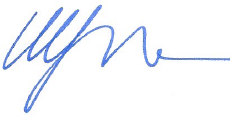
Colonel (Retired) Nishika Jardine
Veterans Ombud
OUR ORGANIZATION
Our organization consists of the following:
- Veterans Ombud
- Deputy Veterans Ombud and Executive Director
- Intervention Services Unit
- Strategic Review and Analysis Directorate
- Communications Directorate
- Corporate Services Directorate
The Office of the Veterans Ombud (OVO) has offices in Charlottetown, PE, and Ottawa, ON, with 28 employees based in our office locations and 6 employees teleworking from other parts of Canada. The OVO continues to follow the hybrid work model of the Federal Public Service, meaning that during the 2023-2024 fiscal year, staff were in the office a minimum of two days a week in both Charlottetown and Ottawa.
We strive for excellence in our work and we value the insights, resources and training available through various ombuds organizations. The OVO is a member of the International Ombudsman Institute and the Forum of Canadian Ombudsman (FCO), and all OVO employees complete the Essentials for Ombuds training course offered by the FCO and Osgoode Professional Development.
Land Acknowledgement
We acknowledge that the lands on which we live, work, and gather, are on the traditional territories of many Indigenous nations. Our Charlottetown office is on the unceded territory of the Mi’kmaq People who have occupied the island of Epekwitk (Prince Edward Island) for over 12,000 years. Our Ottawa office is on the unceded territory of the Anishinaabe Algonquin nation whose presence there reaches back to time immemorial.
Education on the past and present relationship between Indigenous Peoples and the Canadian Government as well as cultural bias and Indigenous perspectives training is one part of our commitment to reconciliation. We continue to connect with members and representatives of Indigenous Veterans communities and organizations as we incorporate recommendations from the Truth and Reconciliation Commission in our work serving Veterans and their families.
Who We Are
We investigate complaints and challenge the policies and decisions of VAC where we find individual or systemic unfairness. We strive to be an independent and respected voice for fairness and a champion for the well-being of Veterans and their families.
What We Do
- We operate independently and impartially
- We listen to our clients
- We review their files and walk them through the process to their next steps
- We identify and review emerging and systemic issues related to VAC programs and services
- We facilitate client access to VAC programs and services by providing information and referrals
Our Priorities
- Building trust: We meet regularly with the Veterans Community and provide service to anyone who brings an issue to us.
- Creating better outcomes for the Veterans Community: When we notice problems and/or gaps with VAC services and benefits, we recommend changes to improve the overall health and well-being of Veterans and their families.
- Ensuring fair and timely access: We continuously work to identify unfair, inefficient and overly complex elements in the administration of VAC programs and services.
Why should Veterans contact us?
Everyone seeking or receiving services and/or benefits from VAC has the right to be treated with respect, dignity, fairness and courtesy. This is set out by VAC in the Veterans Bill of Rights.
If Veterans feel like any of their rights have not been upheld or a decision is unfair, they have the right to make a complaint to the Office of the Veterans Ombud.
OUR CLIENTS
Similar to previous years, the highest number of complaints we received were about health supports and the wait times associated with disability benefit application decisions. Despite receiving nearly 100 more complaints and inquiries than last year and over 700 more complaints and inquiries than we did in 2021-2022, we exceeded our service standard of investigating 75% of complaints within 60 days by investigating 93% within that time frame. Unfortunately, we did not meet our service standard for information requests and referrals. We experienced many employee departures, and newly hired staff required learning time. In addition, we conduct quality assurance on 100% of the files completed by new staff, which resulted in later official closing dates for many of our information and referral files.
Intervention By The Numbers
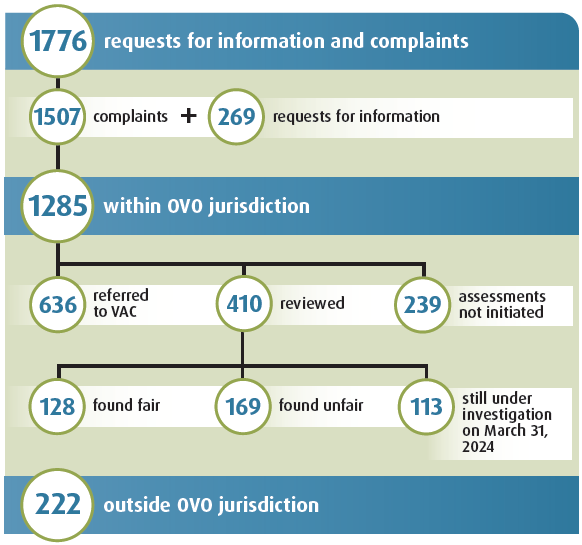
Alternative Text
1776 requests for information and complaints
1507 complaints + 269 requests for information
1285 within OVO jurisdiction
636 referred to VAC
410 reviewed
239 assessments not initiated
128 found fair
169 found unfair
113 still under investigation on March 31, 2024
222 outside OVO jurisdiction
Client Complaints/Inquiries by Province and Territory
Footnote 1
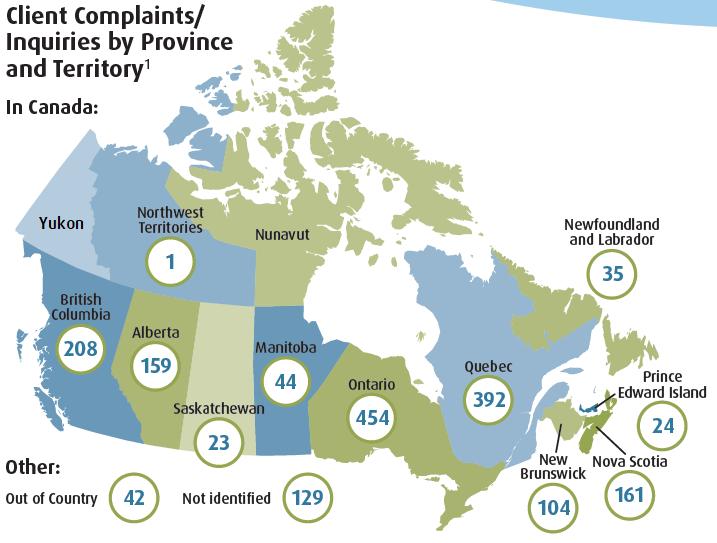
Alternative Text
In Canada:
Alberta – 159
BC – 208
MB – 44
NB – 104
NL – 35
NS – 161
ON – 454
PE – 24
QC – 392
SK – 23
YT – 0
NT – 1
NU – 0
Other:
Out of Country – 42
Not identified – 129
Complaints by Client Category
Footnote 2
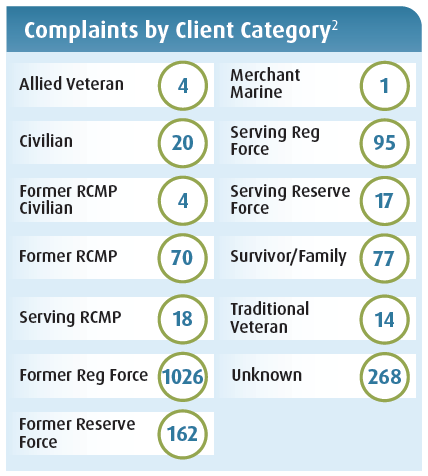
Alternative Text
Allied Veteran – 4
Civilian – 20
Former RCMP Civilian – 4
Former RCMP – 70
Serving RCMP – 18
Former Reg Force – 1026
Former Reserve Force – 162
Merchant Marine – 1
Serving Reg Force – 95
Serving Reserve Force – 17
Survivor/Family – 77
Traditional Veteran – 14
Unknown – 268
Clients by Age
Footnote 3
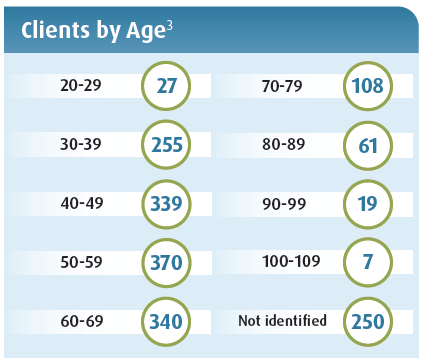
Alternative Text
20-29 – 27
30-39 – 255
40-49 – 339
50-59 – 370
60-69 – 340
70-79 – 108
80-89 – 61
90-99 – 19
100-109 – 7
Not identified – 250
Clients by Gender
Footnote 4
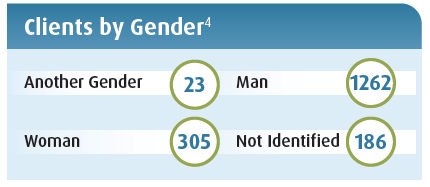
Alternative Text
Another Gender – 23
Man – 1262
Woman – 305
Not Identified – 186
Preferred Language
Footnote 5

Alternative Text
English – 1363
French – 413
Service Standards
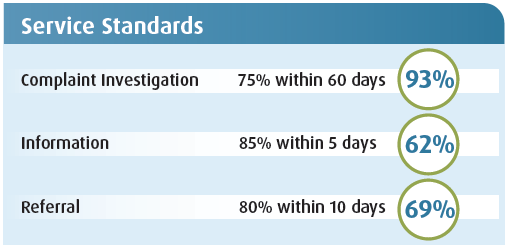
Alternative Text
Complaint Investigation – 75% within 60 days – 93%
Information – 85% within 5 days – 62%
Referral – 80% within 10 days – 69%
FEATURED CASES
Coverage Confusion: Veteran Reimbursed After Unfair Denial of Hearing Treatment
ISSUE: A Veteran contacted our office after being denied coverage for a treatment related to his pensioned condition. According to his audiologist, the Veteran’s service-related tinnitus could not be treated until another related condition causing noise sensitivity was resolved. Despite submitting supporting documentation including detailed expert medical evidence, the Veteran was denied coverage for noise sensitivity treatment after both an initial application and an appeal. After months of frustration, he turned to the OVO for help.
VAC's Entitlement Eligibility Guideline for tinnitus includes the Veteran’s specific secondary hearing condition, hyperacusis (noise sensitivity). Therefore, the client should have been eligible for hyperacusis treatment because he had the pensioned condition of tinnitus. The OVO reviewed the complaint and brought the issue to VAC’s attention.
ACTION: VAC re-examined the situation and confirmed that the requested treatment for noise sensitivity should have been covered because the client had entitlement for tinnitus. VAC clarified the policy and coverage guidelines and approved reimbursement for the treatment.
RESULT: Over a year after being unfairly denied hearing treatment coverage, the Veteran finally received reimbursement for the treatment he needed.
Pricey Prescription: Quick Action Granted Veteran Access to Much Needed Medication
ISSUE: Sometimes a switch from one medication to another can introduce difficulties in the approval and coverage process. This was the case for a Veteran suffering from an autoimmune disorder, whose doctor prescribed a different medication after the previously approved treatment caused uncomfortable and unmanageable side effects. Although the specialist provided a thorough rationale, because the medication in question was not included in VAC's standard formulary, or list of approved medications, coverage was denied. The necessary medication cost thousands of dollars per month and the Veteran faced the choice of either continuing to suffer, or paying out of pocket in order to treat his disability entitled condition. He contacted the OVO and asked us to intervene.
Time was of the essence for this Veteran, and while the VAC process would usually direct the Veteran to appeal the decision and await the results of that review over the course of up to three months, the file took a shorter route thanks to OVO assessment and intervention.
ACTION: VAC’s Exceptional Benefits Unit examined the evidence along with the specialist’s detailed explanation of why other potential medication options were inappropriate or even harmful to the Veteran’s health and well-being. Within a week, VAC approved coverage of the prescribed medication.
RESULT: The Veteran received retroactive approval and was able to access the expensive medication all within a few weeks of contacting our office.
Timely Treatment: Corrected Decision Supports Veteran’s Goal to Start a Family
ISSUE: Up against a rapidly closing treatment window, a Veteran reached out after Veterans Affairs Canada (VAC) denied her application and appeal for fertility treatment cost coverage. An OVO Issues Analyst reviewed the case and discovered that VAC had mistakenly considered the application under the wrong coverage category.
VAC coverage for medications and treatments varies based on the Veteran’s disability entitled conditions and their coverage category. Broadly defined, A-line coverage category requires a link to an entitled condition, and B-line coverage category does not require a link to an entitled condition but generally only includes medications and other treatment not covered through provincial or private health care insurance. In this case, the treatment was initially denied because it was considered under A-line coverage and the condition had no established link to service on file.
ACTION: Once the OVO had identified the error and notified VAC, VAC requested additional medical documentation from the Veteran and reconsidered the authorization under B-line coverage. At the time, VAC was working to implement infertility treatment as an approved benefit as recommended by VAC’s internal review committee. After considering all the evidence, VAC decided to cover nearly all of the Veteran’s treatment costs; this was welcome news for the Veteran, who had already paid for the treatments.
RESULT: VAC corrected its error and reimbursed the Veteran for most of the treatment costs she had incurred. However, had she waited for approval or been unable to even temporarily cover the expenses, it would have been too late to receive the time-sensitive treatment.
SHARING, LISTENING AND CONNECTING
Connecting with Canada’s Veterans, their families, and other stakeholders is critical to maintaining our awareness of issues affecting the Veterans Community.
The OVO has continued our ambitious outreach program from last year. This included meeting with Veterans and stakeholders and holding town halls in Newfoundland and Labrador, Nova Scotia, Quebec, Ontario, Alberta, British Columbia and the Northwest Territories. During these town halls we heard about some of the issues affecting local Veterans, serving CAF and RCMP members, survivors, family and friends. Continuing to be aware of these concerns ensures our work best serves the Veterans Community.
During these many outreach visits, town halls, and meetings we have heard from hundreds of Veterans and their families. One of the most frequent issues raised is the difficulty of getting family physicians and specialists for the completion of VAC medical questionnaires, for disability benefit adjudication, reassessments, and treatment decisions. We have heard that the VAC medical questionnaires are increasingly seen by health care providers as a burden and more and more are refusing to complete them. Another recurrent issue, raised by family members, is the impact on families of dealing with Veterans who have been negatively affected by their service. The chronic shortage of community mental health supports often leaves families without access to treatment for themselves. There is a pressing need to acknowledge the contribution of families to service in the military, and expand the support available to them.
When the opportunities presented, we visited Canadian Armed Forces Bases/Wings, Transition Units, Military Family Resource Centres, and met with CAF senior leaders and serving members to discuss issues related to transition out of the CAF that affect the members and their families. We also met with and visited local organizations whose work supports the Veterans Community, and took part in conferences, forums, and other events that connect stakeholders to current research. Throughout our engagement opportunities, we aimed to raise awareness and knowledge of the OVO’s mandate and services among various audiences, partners, stakeholders, and decision-makers.
The OVO is grateful for the opportunity to meet with the Veterans Community over the past year. The insight gained from our outreach activities will help shape our strategies and priorities.
Outreach Activity

Alternative Text
Meetings with Veterans and Organizations - 46
Major Stakeholder Meetings - 52
MPs and Senators - 9
Parliamentary Committee Appearances - 1
Media - 45
Total - 153
Website and Social Media
Footnote 6

Alternative Text
Website:
43,416 users
131 countries
95,665 views
Social Media:
Facebook followers: 7,785
Instagram followers: 2,696
Twitter followers: 3,385
REPORTS, RECOMMENDATIONS, AND RESOURCES
In 2023-24 our Strategic Review and Analysis team focused on identifying and addressing systemic fairness issues relating to VAC programs and services. We published one systemic report, one letter update to the Minister of Veterans Affairs, two educational resources, and the 2023 Spotlight (formerly the Report Card). We also submitted a letter to the Minister that was published in the following fiscal year.
THE BURDEN OF CARE: A FAIRNESS GAP IN THE VETERANS INDEPENDENCE PROGRAM POLICY Footnote 7
After the publication of our Care at Home Resource Guide, this letter to the Minister comprises the second part of our review of the Department’s care-at-home supports. Following numerous complaints about the Caregiver Recognition Benefit, we launched this review to examine whether there were gaps in the VAC suite of benefits that relate to the supports that Veterans need to stay living at home.
Focusing on the Veterans Independence Program (VIP), the letter contains our finding that the “Relatives” section of the VIP Benefits at Home policy creates a gap in benefits for Veterans and their families, and is also unfair to a Veteran’s live-in relative(s). To address this unfairness, we recommended that VAC review and revise the existing policy and regulatory frameworks to eliminate gaps that create additional burdens for live-in relatives who are meeting the service-related care-at-home needs of Veterans. Options could include:
- Modifying the VIP Benefits at Home Policy to ensure Veterans are not screened out of VIP benefits when a live-in relative is available, able, and willing to perform the tasks
- Implementing a benefit to recognize the additional burden and responsibilities borne by all informal caregivers due to a Veteran’s service-related condition(s)
FULL AND FAIR PAYMENT OF PAIN AND SUFFERING COMPENSATION Footnote 8
We launched this report after receiving a complaint from the family of a Veteran who died shortly after receiving a favourable Pain and Suffering Compensation (PSC) decision, but before the Veteran was able to elect to receive the benefit as a lump sum. We examined whether it was fair that any remaining value of the PSC lump sum cannot be paid to a Veteran’s estate when they have not elected it, given that only surviving spouses, common-law partners, and dependent children may receive the lump sum after the Veteran’s death.
Our report found systemic unfairness in the PSC that particularly impacts single Veterans with no dependent children. To address this unfairness, we made the following recommendations to the Minister of Veterans Affairs:
Recommendations
- Recommendation 1: Resolve the unfairness for single Veterans with no dependent children who would have received more through the Pain and Suffering Compensation lump sum than their monthly payments had they elected it before their death. One option would be for Veterans who die before making the election to be deemed to have elected the lump sum on the day before their death.
- Recommendation 2: Until Recommendation 1 is implemented, ensure Veterans receive detailed and plain language information explaining what happens should they die without having elected the lump sum.
DISABILITY BENEFIT ADJUDICATION PROCESS Footnote 9
The VAC process for adjudicating disability benefit applications can be hard for clients to understand. We made this resource to help Veterans understand what happens to their disability benefit application once VAC has the information it needs to make a decision.
UPDATE: RESOLUTION OF DISABILITY PENSION REDUCTIONS DUE TO MERLO DAVIDSON SETTLEMENT COMPENSATION Footnote 10
>We published an update about the actions VAC took to address the Ombud’s recommendations from her December 2022 letter to the Minister concerning Disability Pension reductions related to Merlo Davidson settlement compensation. That letter detailed our finding of unfairness in VAC’s application of its legal obligation to reduce Disability Pensions by compensation received for the same condition. The letter made two recommendations to address the unfairness.
In this update, we noted that VAC contacted all the known claimants who self-identified as having received Merlo Davidson compensation, and gave them the opportunity to provide more information on whether their Merlo Davidson payment compensated for their pensioned disability. In so doing, VAC made appropriate adjustments that satisfied the intent of our recommendations.
WHAT TO DO WHEN YOU DISAGREE WITH A VAC DECISION Footnote 11
This year, we updated this resource on what to do when you disagree with a VAC decision (first published in 2018, before the introduction of Pension for Life). Intended as a useful tool for clients as well as OVO staff when they provide information to Veterans, this infographic lets Veterans know what their next steps could be depending on the VAC benefit and the level of decision.
Since 2017, we have tracked the progress made by VAC in implementing the recommendations we have made since our Office was established in 2007. Previously this tracking publication was known as our Report Card. In 2023, we renamed it Spotlight to better reflect our intent to continue shining a light and urging action on the issues we have identified.
Spotlight 2023 noted that as of March 31, 2023, VAC had fully or partially implemented 55, or 70%, of the 79 recommendations we continue to track. For the first time, Spotlight 2023 included whether VAC accepts each recommendation.
We also highlighted outstanding recommendations that are particularly pressing, including around families’ access to mental health treatment benefits, as well as the Department’s continuing efforts to ensure equitable access to timely disability benefit decisions. We also noted some outstanding recommendations to conduct Gender-Based Analysis Plus, a need that only increases as the Veteran population diversifies.
In addition, in 2023 we made several adjustments to our tracking process that will be reflected in the 2024 Spotlight and going forward. Based on our consideration of expert advice as well as a scan of ombud practices, these changes are anticipated to include a new category to assess implementation status, and the application of a waiting period before new recommendations are tracked.
VETERANS OMBUD ADVISORY COUNCIL (VOAC)
Members of the Veterans Ombud Advisory Council (VOAC) advise the Veterans Ombud on matters related to the OVO’s mandate. The Council, through its broad range of backgrounds, views, and experience, brings diverse perspectives from the Veterans Community to bear on topics of interest and concern. Through their expertise and knowledge, Council members identify emerging issues and provide advice to address them. VOAC members also raise awareness within the Veterans Community about the OVO and the work we do.
Beth Basinger has been an active member with the Military Family Services Centre that serves the Ottawa-Gatineau region since 2020, where she currently serves on the Advisory Committee and as Secretary. She is the spouse of 29 years to a retired CAF member, and she is trained as a registered nurse.
Brigitte Laverdure, retired Airframe Technician, was born in Magog, QC, and joined the Canadian Armed Forces in 1980. Medically released after 19 years of service, she and her spouse have been helping Veterans obtain benefits from Veterans Affairs Canada. Brigitte received a Veterans Ombud Commendation in 2020 for her work supporting and advocating for Veterans in the LGBTQ community.
Fern Taillefer began his military journey as an Army Cadet with the 204 Algonquin Cadet Corps in North Bay, Ontario, where he spent four years, attaining the rank of Regimental Sergeant Major. Fern served in the Canadian Armed Forces from 1974 to 1996, and since his retirement, he has dedicated his life to serving those who served. In 2022, Fern received a Veterans Ombud Commendation for his longstanding commitment to Veterans.
Jane Hall (née Greenwood) served 21 years in the RCMP (1977-98). Her last post was as Training NCO (Cpl.) for Surrey Detachment. Post-service she authored The Red Wall: A Woman in the RCMP (2007). In addition, she served as Chair of the Women in Leadership: Public Safety Leadership Development Consortium 2009-2013, co-chair of the RCMP Veteran Women’s Council 2013-present, past president of Police Futurists International (PFI) 2018-19, and as a member of Women Veterans Research and Engagement Network (WREN) 2019-present.
Jay Milne
Major General John (Jay) Milne (retired), MSM, CD, served 38 years in the Canadian Armed Forces as a Signal Officer in the Regular Force and as an Armoured Officer in the Primary Reserve. He has commanded at the troop, squadron, unit, and brigade levels, and has served in different capacities at the National Defence Headquarters (NDHQ). Before releasing in 2018, he served as special advisor to the Deputy Minister of Veterans Affairs Canada.
Stephen Walker
Staff Sergeant Stephen Walker (retired) served 31 years in the Royal Canadian Mounted Police. Throughout his career, he served in the Province of Manitoba as a police officer in rural and Indigenous communities. He was posted to Detachments, Major Crime, Organized Crime units and was a Staff Relations Representative for the RCMP in Manitoba. He has also served on various Committees and Boards of Directors during and since his service with the RCMP.
Wendy-Anne Jocko joined the Canadian Armed Forces in 1979 and served for 23 years. Throughout her career she served in Edmonton, Calgary, Chilliwack, Petawawa, and completed two tours in Bosnia and Croatia. Wendy-Anne is currently the Indigenous Liaison with Innovation7, and a Committee Member with the Assembly of First Nations Veterans Council. Prior to this she was the Chief of the Algonquins of Pikwakanagan First Nation, leading them through the COVID-19 pandemic and on to a Treaty and Self-Government.
VETERANS OMBUD COMMENDATION AWARDS
The annual Commendation Awards honour outstanding individuals and groups who demonstrate their commitment to the Veterans Community through their selfless, hard work. Recipients are nominated by their peers for their exceptional contributions and dedication to improving the lives of Veterans and their families.
2023 Recipients
Lifetime Contribution
William Sergeant
Joseph E. L (Larry) Gollner
Individual Contribution
Allan Wellwood
Darrel Sundholm
Local Organization
427 Wing
RCMP Heritage Centre
National Organization
Canadian Peacekeeping Veterans Association
Pepper Pod
LOOKING AHEAD
The Veterans Ombud has planned continued outreach for the fall of 2024. These engagements offer an excellent opportunity to update Veterans and their families on the OVO’s work and to highlight concerns regarding fairness issues that our office has identified.
Additionally, in October, the Veterans Ombud will participate in the Canadian Institute for Military and Veteran Health Research’s 2024 Forum in Winnipeg. This annual event allows us to support and engage with the latest research on the needs of Veterans and their families.
Furthermore, preparations are underway for the highly anticipated 2024 Veterans Ombud Commendation Awards, which will take place in November.